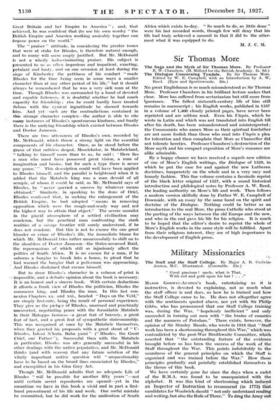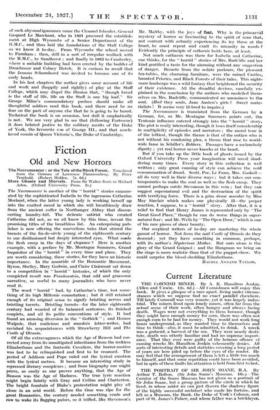Military Missionaries
The Staff and the Staff College. By Major A. R. Godwin- Austen, M.O. Illustrated. (Constable. 21s.)
" Good gracious ! uncle, what is That, With red and gold upon his hat ? . . ."
MAJOR GODWIN-AUSTEN'S book, entertaining as it is instructive, is devoted to explaining, not so much What the staff officer is and does, as how, he is trained and how the Staff College came to be. He does not altogether agree with the sentiments quoted above, nor yet With Sir Philip Gibbs, who has pronounced that pur Staff College training was, during the War, "hopelessly inefficient" and only succeeded in turning out men with "the, brains of canaries and the manners of Potsdam." There exists, however, the opinion of Sir Stanley Maude, who wrote in 1916 that "Staff work has been a shortcoming throughout this War," which was contradicted by the post-War Braithwaite Committee, which asserted that "the outstanding feature of the evidence brought before us has been the success of the work of the Staff throughout the War. This points indubitably to the soundness of the general principles on which the Staff is organized and was trained before the War." How those principles gradually and Painfully established themselves is the theme of this book.
We have certainly gone far since the days when a cadet of the E.M.A. was found to be unacquainted with the alphabet. It was this kind of shortcoming which 'induced
an Inspector of Instruction to recommend (in 1773) that
candidates for 'Woolwich should "not only understand reading and writing, but also the Rae of Three." To drag the Army out
of such abysmal ignorance came the ChannetIslander, General Gaspard Le Marchant, who in 1801 procured the establish- ment at High Wycombe of a Senior Department of the R.M.C.,- and thus laid the foundations of the Staff College as we know it to-day. From Wycombe the school moved to Farnham ; then, still in a sort of irregular wedlock with the R.M.C., to Sandhurst; and finally in 1862 to Camberley, where a suitable building had been erected by the builder of Broadmoor and Colney Hatch. It is curious to recall that the famous Scharnhorst was invited to become one of its early heads.
In his last chapters the author gives some account of life and work and (happily and rightly) of play at the Staff College, which may dispel the illusion that, though bread is the staff of life, life on the Staff is one big loaf." Sir George Milne's commendatory preface should make all thoughtful soldiers read this book, and there need be no fear on the part of anyone else that he is going to be bored. Technical the book is on occasion, but dull it emphatically is not. We are very glad to see that (following Fortescue) it does belated justice to the military merits of the Duke of York, the favourite san of George III., and that much- loved cousin of Queen Victoria's, the Duke of Cambridge.































 Previous page
Previous page